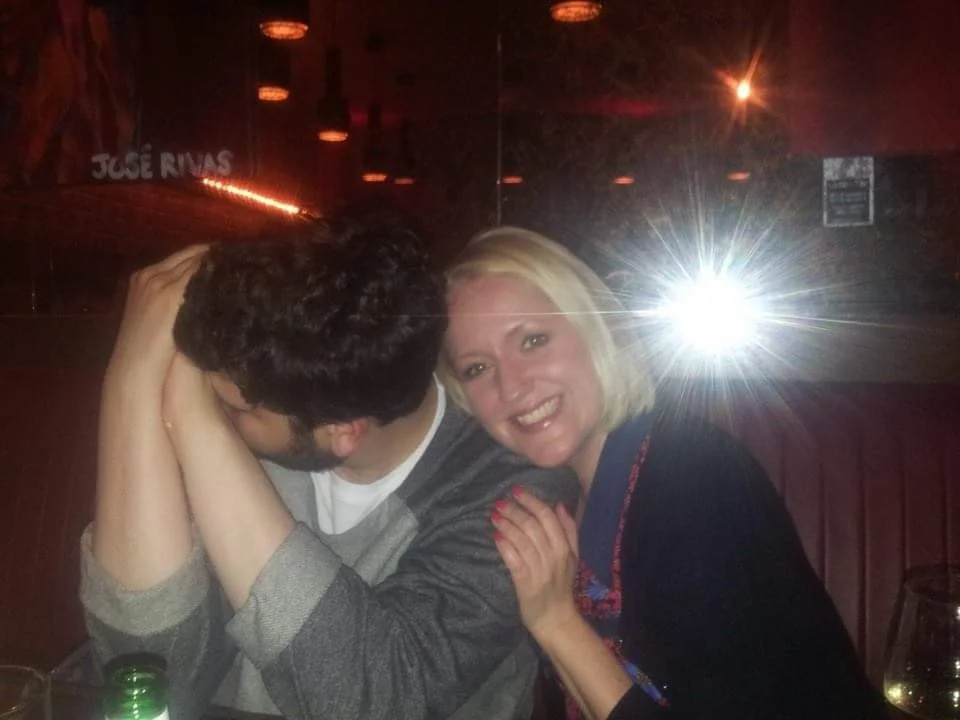Five Questions for Professor Sarah Perks
Professor Sarah Perks is one of those rare specimens—a human being with a capacious intellect that spans the gamut from quantum physics, climate justice, and the benefits of karaoke. Professor of Curating at MIMA x Teesside University’s School of Creative Industries, Perks has come on board to guest host and produce this summer’s flagship podcast episode. Here, she reveals to artPost21, her thinking behind the whole process.
Image courtesy of Sarah Perks
Q: Professor Perks, you are the first person that we've trusted to take over the artPost21 podcast. We gave you some raw material and asked you to run with it. What were the first thoughts that came into your mind?
My first thought was pure excitement and joy! I love this podcast, I’m in a creative expanded curatorial zone at the moment, I love Trevor Paglen, and most of all, I love the beautiful golden Internet_Art book that you wrote! I poured a glass of wine, wrote notes, and talked into my phone. At first, the text came out as pure nonsense, due to the poor AI app on my phone, but that initial recording was the full basis for all my subsequent augmentations.
Q: How have you chosen to approach this special edition of the artPost21 podcast?
I decided to turn the podcast into a workshop, with two main aims: to support the amazing conversation between Dr. O. and Trevor Paglen as best I could, and to trial ways of getting people to actively listen. I didn’t want to be a commentator or an explainer, and I didn’t want any kind of sarcasm or irony. Professor Perks is all about fun and experimentation. When I produce workshops, I create them as a distinct part of both my artistic and curatorial practice. I currently run workshops that use eco-psychology to connect with nature recovery, for example. In such a scenario, an animal might adopt you, and you perform them in a council setting. I promise it’s more fun than it sounds. I am developing different forms of meditation that drill into the body, to get one into right head space. I often like to use flash forwards (talking about things that are revealed later). For me, storytelling is a philosophical strategy. I am also firmly committed to everything ending in karaoke. There are nods to various songs and films in there too, I obviously reference This Mortal Coil and Mazzy Star.
Q: Podcasts had died a death, but they seem to have been resuscitated from the graveyard of uncool, like the vinyl record. Why do you think that is?
I guess nothing ever dies, it just goes away to come back. I’m so glad they are such a big thing now, mostly because you can multi-task (travel, exercise, sleep!) and still listen even though I tell people not to do that in this episode. They suit the contemporary media landscape. Podcasts exist somewhere between radio and episodic television. They are easier for most people to make and access. They are only 20 years old, but they’ve grown transcending generational gaps; so much more shareable than a TV episode. There’s also something intimate about the voice through your headphones too. It taps into the same place of the memoir being read by the author; I want that dreamy feeling!
Q: Your episode reflects on the possibilities of "zen" that can still be found in the age of networked culture. Is it important to remain physically and psychically embodied today, an age that we refer to as the age of the internet?
I’m not sure it really matters, and I sort of hope they connect even further, and it all gets blurry - not to go all Haraway Cyborg here - but the more we reject the divisive binaries we are constantly presented with, the further we might grow and understand each other and everything else. That’s why I often refer to quantum physics, it’s only the relations that exist for us, so my thoughts would follow that no, we don’t need to be like X, Y, Z. Tech isn’t yet as we want it to be I am all about dreaming. I want us to feel like we are really embodied elsewhere. For me that ‘zen’ is about connecting to everything – and revelling in the connection, that’s the charge, the pulse.
Q: You end with a beautiful, and vulnerable song for listeners. Can you tell us more about your song choice here? It's also one of Dr. O's favourite songs!
Well, the song is a classic… it’s so fragile, longing, and sexy! It’s about falling for someone who’s just after a booty call (according to the singer) or you could take it as unrequited love more generally. I changed the odd lyric, particularly in the chorus itself to make it more positive, so it’s more about teasing the other lover to come forward, a sort of admonishing, lusty return desire-proposition to their call (” okay casual lover, why don’t you want to fall in love? I do!”). I didn’t labour over it, and I really hope people know that I’m playing the piano myself, and that’s why I miss the odd note!! Please sing along with me!
I’m also singing it as a love letter to the internet, the internet is like that casual lover/person/thing that you can’t quite get to adore you or fully join you. But then there they are, calling you up still, so something is happening, you aren’t imagining it, and there’s a transparency at play here that can deepen affection potentially. It’s all easier said than done though, and hard to control if you need, want, or must. I also think love is far from restricted between humans too, all things non-human from AI to nature are embedded in our collective futures and our future love affairs.


